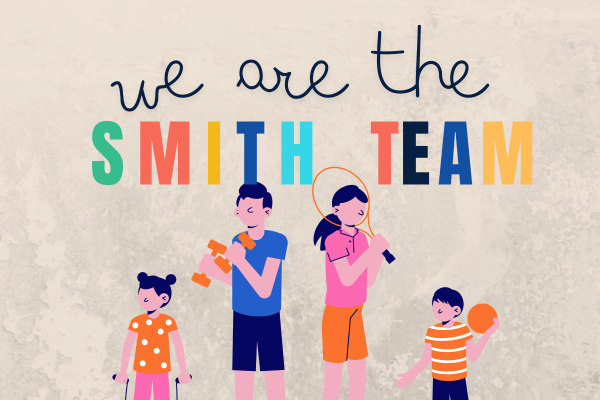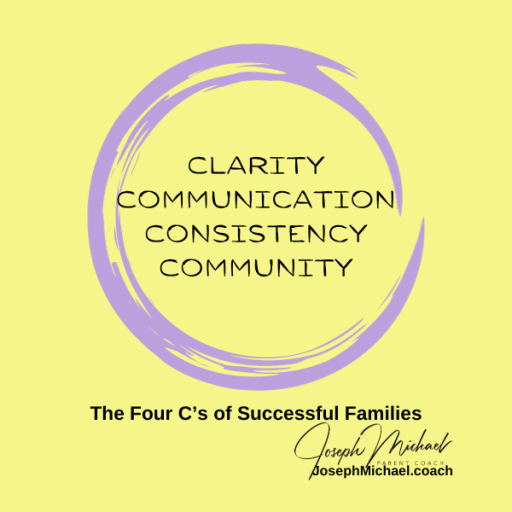
From Teamwork to Family Success

Strengthening Bonds through Key Qualities
Creating a harmonious and supportive family environment can be challenging, but by applying the principles of a successful team, you can build a family that thrives together. Let’s explore eight key qualities that can transform your family into a strong, cohesive unit, and see how the Four C’s of Successful Families—Clarity, Communication, Consistency, and Community—tie into each aspect.
Imagine your family as a team, each member with unique strengths, working together toward shared values and goals. Like in any great team, teamwork doesn’t mean everyone is doing the same thing—it means each person contributing their best and supporting one another’s individual dreams while staying committed to the family’s collective vision.
How do you foster teamwork in your family? Share your thoughts below!
1. Shared Vision and Goals
A team thrives when everyone is working towards common objectives. Families, too, benefit from identifying and agreeing on shared values and long-term goals. Whether fostering a sense of togetherness, achieving financial stability, or supporting each member’s personal growth, having a shared vision keeps everyone aligned.
Four C’s Tie-In: Clarity is essential when establishing a shared vision. Make time to discuss and define your family’s core values and long-term goals. When everyone understands what the family stands for and what they are working towards, it creates a unified sense of purpose.
2. Clear Communication
Communication is the backbone of any successful team, which is valid for families. Open, honest, and respectful communication allows each family member to express their thoughts, feelings, and needs. This helps avoid misunderstandings and strengthens bonds. Clear communication ensures everyone feels heard and valued, fostering a sense of belonging.
Four C’s Tie-In: Communication is a cornerstone of family life. Could you set up regular family meetings or daily check-ins where everyone can share their thoughts and concerns? By prioritizing clear communication, you build trust and understanding, making it easier to navigate challenges together.
3. Flexibility and Adaptability
Teams that succeed are those that can adapt to changing circumstances. Families can apply this by being open to change, willing to adjust plans as needed, and remaining flexible in their expectations. Flexibility allows families to navigate life’s unpredictability with grace and resilience.
Four C’s Tie-In: Communication is crucial when navigating changes. Regularly discuss upcoming changes or challenges as a family, ensuring that everyone has a voice in how to adapt. Flexibility, combined with clear communication, helps families remain strong even in the face of uncertainty.
4. Conflict Resolution Skills
Every team encounters conflicts, but successful teams address them constructively. Families can benefit from learning how to resolve disagreements calmly, focusing on solutions rather than blame, and ensuring that everyone feels heard. Effective conflict resolution strengthens relationships and fosters a peaceful home environment.
Four C’s Tie-In: Clarity and Communication are vital in conflict resolution. Be clear about expectations and the family’s approach to resolving disputes. Encourage open communication, where everyone feels safe to express their feelings and work towards a solution that honors each person’s perspective.
5. Trust and Respect
Trust is the foundation of any effective team. Families should cultivate trust by being reliable and consistent, respecting each other’s boundaries, and maintaining an environment where everyone feels safe to express themselves. Trust and respect create a sense of security that is vital for healthy relationships.
Four C’s Tie-In: Consistency is key to building trust. When family members know they can rely on each other and that expectations are clear and fair, it fosters a deep sense of trust. Respect each person’s individuality while maintaining consistent family values and rules.
6. Accountability
In a team, each member takes responsibility for their role. Families can apply this by ensuring that everyone understands their responsibilities within the household and holds themselves accountable for their actions. Accountability fosters a sense of ownership and responsibility, essential for personal and family growth.
Four C’s Tie-In: Consistency plays a role in establishing accountability. Set clear expectations and consequences, and be consistent in enforcing them. When everyone knows what is expected and that they will be held accountable, it promotes a sense of fairness and responsibility.
7. Mutual Support
In a successful team, members support each other, recognizing that each person’s success contributes to the group’s success. Families can apply this by encouraging and helping one another, celebrating each other’s achievements, and offering a helping hand during challenging times. Mutual support strengthens relationships and builds resilience.
Four C’s Tie-In: Community reflects the idea that a family is stronger when its members support one another. Cultivate a family culture where everyone pitches in to help, whether with household chores, emotional support, or celebrating successes. This creates a close-knit community within your home.
8. Celebration of Diversity
A successful team values the unique contributions of each member. Families can embrace each person’s individuality, recognizing that different perspectives and strengths make the family stronger. Celebrating diversity within the family encourages acceptance and appreciation of each person’s unique qualities.
Four C’s Tie-In: Community thrives on diversity. Encourage each family member to explore and share their interests, talents, and ideas. By celebrating what makes each person unique, you strengthen the family’s sense of community and foster an environment where everyone feels valued.
Invitation to Learn More: The Four C’s of Successful Families
By applying these eight principles, you can build a family dynamic that mirrors the success of a well-functioning team. But there’s more to explore! The Four C’s of Successful Families—Clarity, Communication, Consistency, and Community—offer a framework for deeper understanding and practical strategies that can take your family’s teamwork to the next level. Join us as we dive into each of the Four C’s and discover how they can transform your family life.
Stay tuned for more insights and practical tips in our upcoming posts!
Joe is a husband, father, grandfather, author, speaker, educator, course creator, and parent/family coach.
He helps parents develop unity, find clarity, communicate, and develop consistency in their parenting with the Four C’s of Successful Families. You can find his work on social media.
In addition, the Four C’s newsletter is enjoyed by many as it encourages parents to self-care, build their relationships with their partners, and raise their children.
And he loves to golf!

